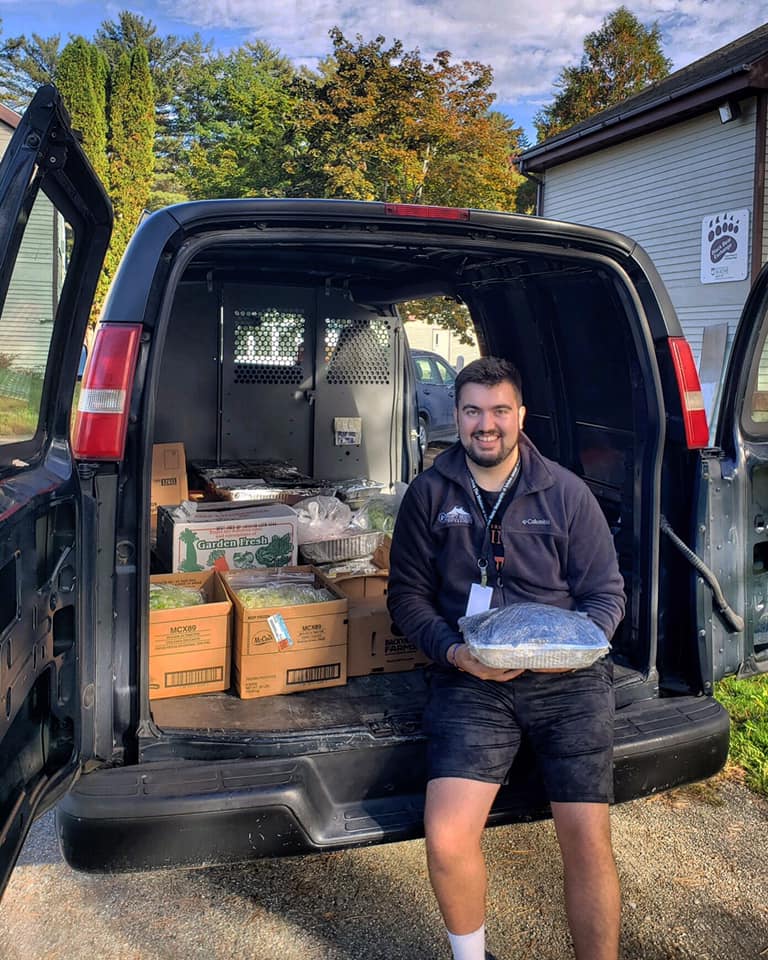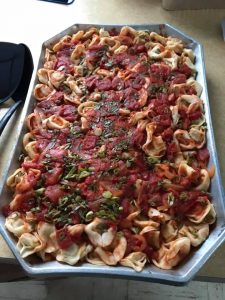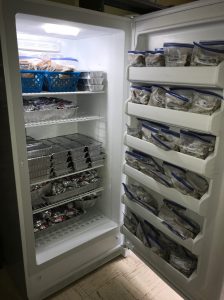Lisa Morin and Student Groups Fight Food Insecurity on Campus
By Seentia Islam
Many low-income families today turn to their local food banks to meet their unmet food needs. Unfortunately, these food banks are not available on most college campuses. With meal plans and other expected forms of food consumption and distribution, communities rarely associate college campuses with food insecurity. However, food insecurity can easily be found in student populations. According to Hunger on Campus, a 2016 report on food insecurity at 32 U.S. colleges, 48% of students reported experiencing food insecurity, and 22% reported experiencing very low levels of food security.
“It’s not a matter of asking IF they’ve eaten but asking WHAT they’ve eaten.”
– Lisa Morin, Coordinator of the University of Maine Bodwell Center for Service and Volunteerism

To address the challenge of student food insecurity, the University of Maine provides community-supported food services through the Black Bear Exchange, an on-campus clothing exchange and food pantry. Anyone with a MaineCard is welcome to visit the food pantry. According to Lisa, Coordinator of the University of Maine Bodwell Center for Service and Volunteerism and founder of the Black Bear Exchange, the University of Maine was the first campus to have a food pantry in the state of Maine and has been a great example of similar campus wide initiatives.
“We have been trying to figure out how to address food insecurity amongst our college students. Recognizing the issues that cause it and then trying to find creative solutions to be able to help them. The resources on every campus are different. The needs on every campus are different. It’s not like you can make a cookie cutter program and tell everybody to start it.”
– Lisa Morin
The success of the Black Bear Exchange food pantry is due, in part, to a food recovery program. Donations made by the University of Maine dining halls are collected by sustainability-focused student groups such as The Green Team and Green Campus Initiative (GCI). The student volunteers love and appreciate that the program addresses both social and environmental sustainability.
“This specific program is looking at recovering excess food from the dining halls. I think it’s important because if you don’t recover it, it’ll either end up being composted or just sitting in a landfill. Essentially, that means that all the energy that went into producing that food was a waste.”
– Scott Lariviere ’19, Green Campus Initiative

The food recovery process begins with the dining halls on campus. Although, UMaine Dining has made tremendous efforts to minimize waste in each dining establishment, there still may be some leftover food, such as trays of prepared food or fresh ingredients. Once a week, Green Team and GCI visit each dining hall to recover leftover food for further use and distribution. The food is brought to the Black Bear Exchange, dated, split into smaller portions, sealed, and stored in freezers.
While community donations regularly come in during November and December as part of holiday food drives, there is a lack of donations during other crucial times of the year. During the spring semester when students are especially busy, sometimes there are not enough community donations to provide for those in need of a balanced, healthy meal. Instead, some students end up surviving on pasta and microwaveable food items that are lacking in nutritional value. During these difficult months, the UMaine food recovery program is vital for keeping the Black Bear Exchange shelves stocked.


Conversations sparked by food drives and donations are just as important as the items they receive. According to Lisa, “Anytime the people can talk about [food insecurity], that’s the best thing that they can do.” Discussing food insecurity both spreads awareness of the resources offered by the Black Bear Exchange and reduces the stigma of food insecurity. The Black Bear Exchange is open to anyone at UMaine, whether they are looking for one meal or ten.
Surveys show that food insecurity significantly impacts student success. Of the food insecure students surveyed by Hunger on Campus, 32% believed that hunger had direct impacts on their education, including a decrease in their overall academic performance, missing a class, not buying a required textbook, or dropping a class. For Lisa, every healthy meal given to a hungry student has a direct impact on that student’s academic success at UMaine.
“Our goal is to invest in our students. We are going to take these resources and invest it in them because we want them to stay here. We want them to finish their education because they then are going to be productive themselves. They’re going to support themselves. They’re going to support their families. They’re going to be supporting their communities. There’s a good possibility if they receive these kind of resources that they’re going to try to find ways themselves later on to help other people find those resources.”
– Lisa Morin
